Abstract
OBJECTIVE--To investigate whether mammography raises anxiety in routinely screened women who receive a negative result. DESIGN--Prospective design in which women completed questionnaires at three key points in the breast screening process: at baseline (before being sent their invitation for breast screening), at the screening clinic immediately before or after screening, and at follow up, about nine months after baseline. Information was obtained from non-attenders as well as from attenders. SETTING--Bromley District Health Authority, served by the South East London Breast Screening Service. PARTICIPANTS--Two overlapping samples were used. Sample A comprised 1500 women aged 50-64 who were due to be called for first round screening at a mobile screening unit. Altogether 1021 (68%) returned a usable questionnaire and 795 of these (78%) also provided adequate information at nine month follow up: there were 695 attenders (including 24 women who received false positive results) and 100 non-attenders. Sample B consisted of 868 women who attended the screening unit in a three month period, 732 (84%) of whom provided adequate data. A total of 306 attenders (including 10 who received false positive results) occurred in both samples and provided adequate information on all occasions. The main analyses were based on these 306 women plus the 100 non-attenders. The analysis of retrospective anxiety took advantage of the larger sample size of 695 attenders. MAIN RESULTS--On average, the women were not unduly anxious at any of the three points in the screening process. Among attenders, there was no difference between anxiety levels immediately before and immediately after screening. Anxiety was lowest at the clinic and highest at baseline but the changes were very small in absolute terms. Anxiety did not predict attendance: there were no differences in anxiety levels between attenders and non-attenders at baseline. As expected, women who received false positive results recalled feeling extremely anxious after they had received the referral letter but their retrospective anxiety was also higher than in the negative screenees at earlier stages in the breast screening process. They also reported having experienced more pain and discomfort during the x ray. CONCLUSIONS--Anxiety does not seem to be an important problem in routinely screened women who receive a negative result. This finding is very reassuring in relation to a major criticism of breast screening programmes. Thus, apart from maintaining current procedures such as keeping waiting times to a minimum, there seems to be no need to introduce special anxiety reducing interventions into the national programme. On the other hand, the findings for women who received false positive results suggest that there are aspects of the experience of being recalled for assessment after an abnormal mammogram that warrant further attention. The relationship between contemporaneous and retrospective anxiety should also be studied.
Full text
PDF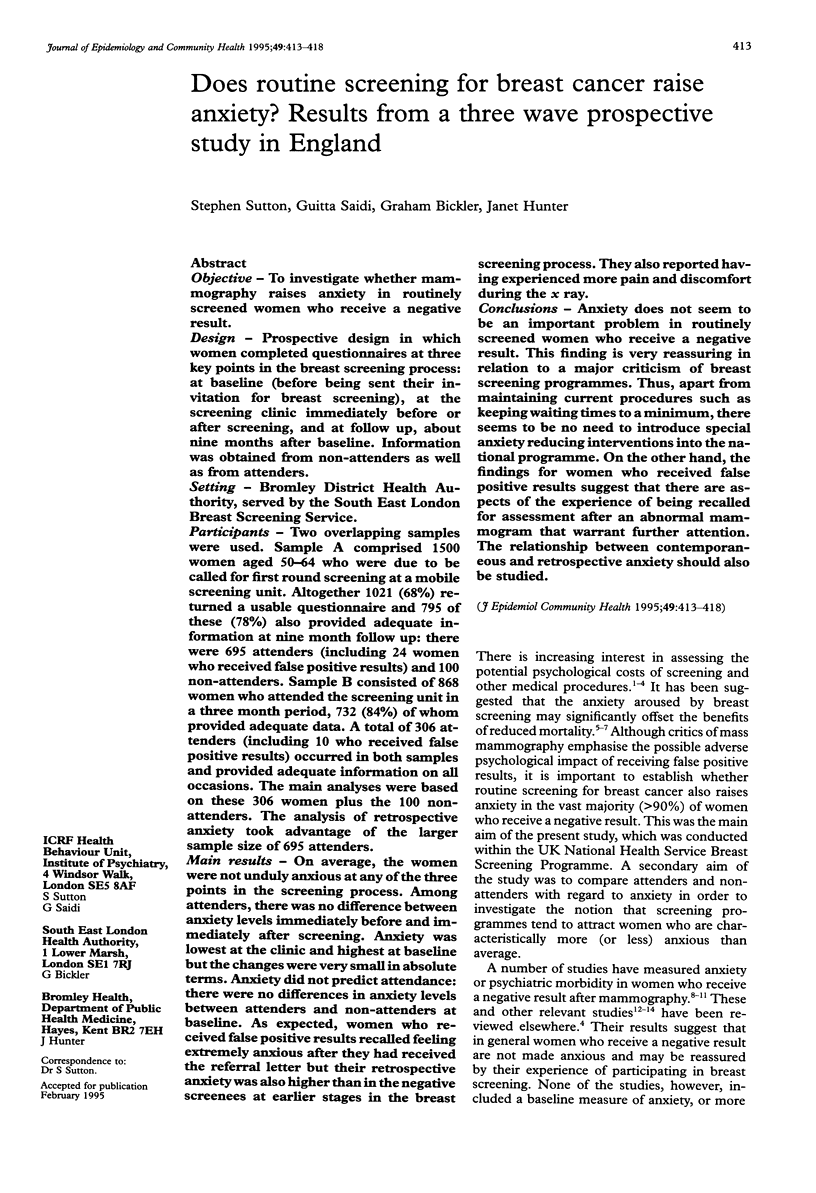
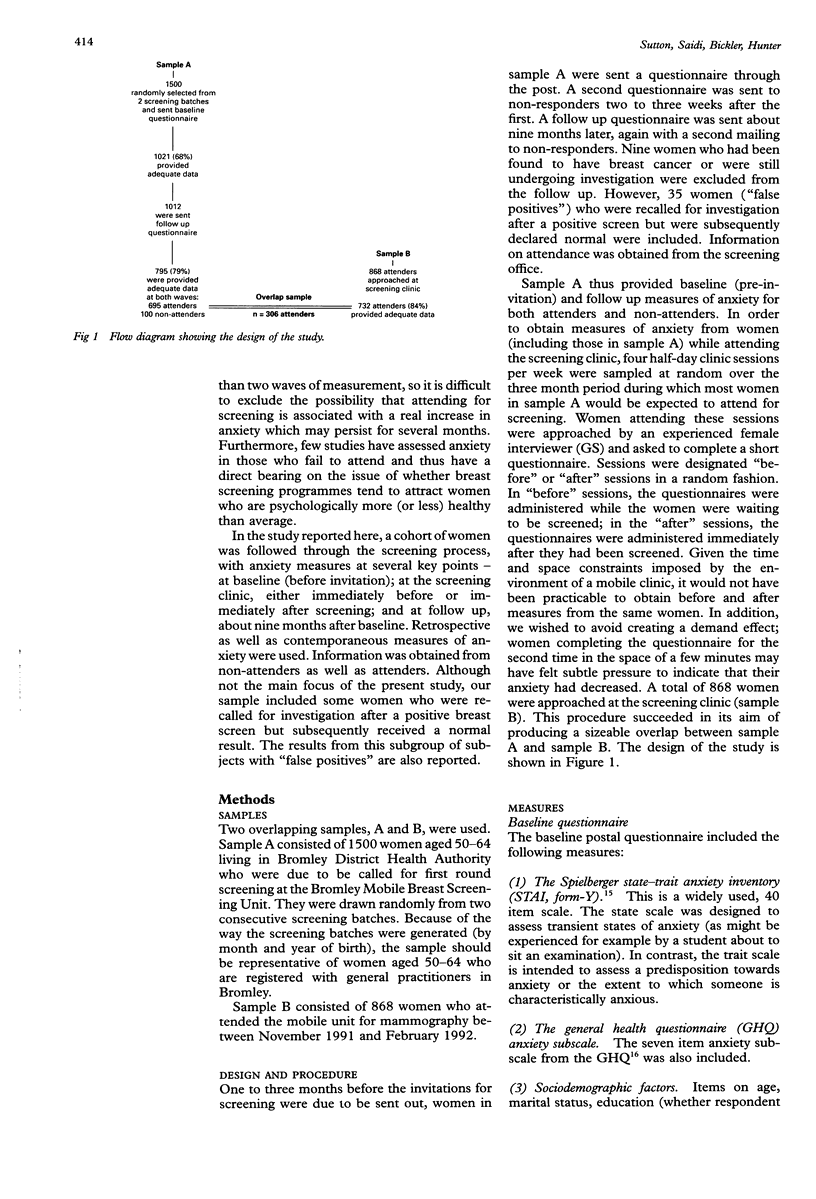
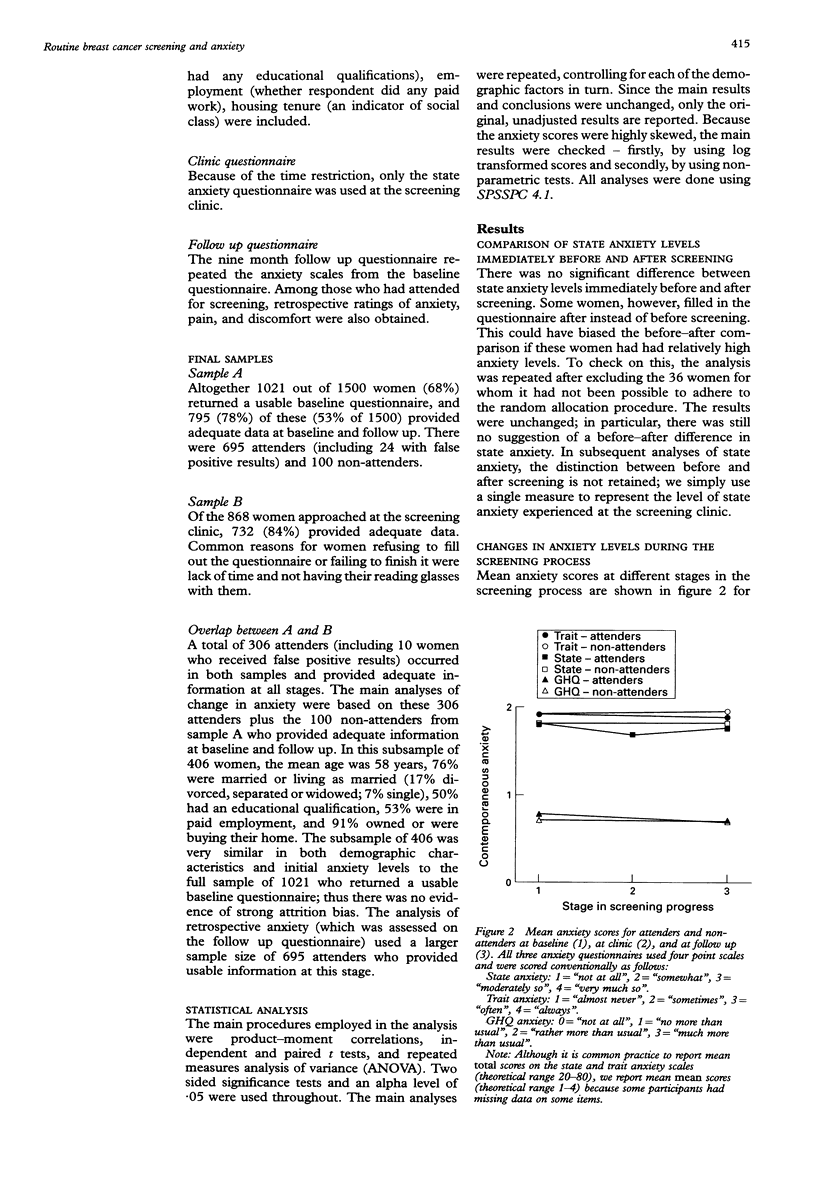
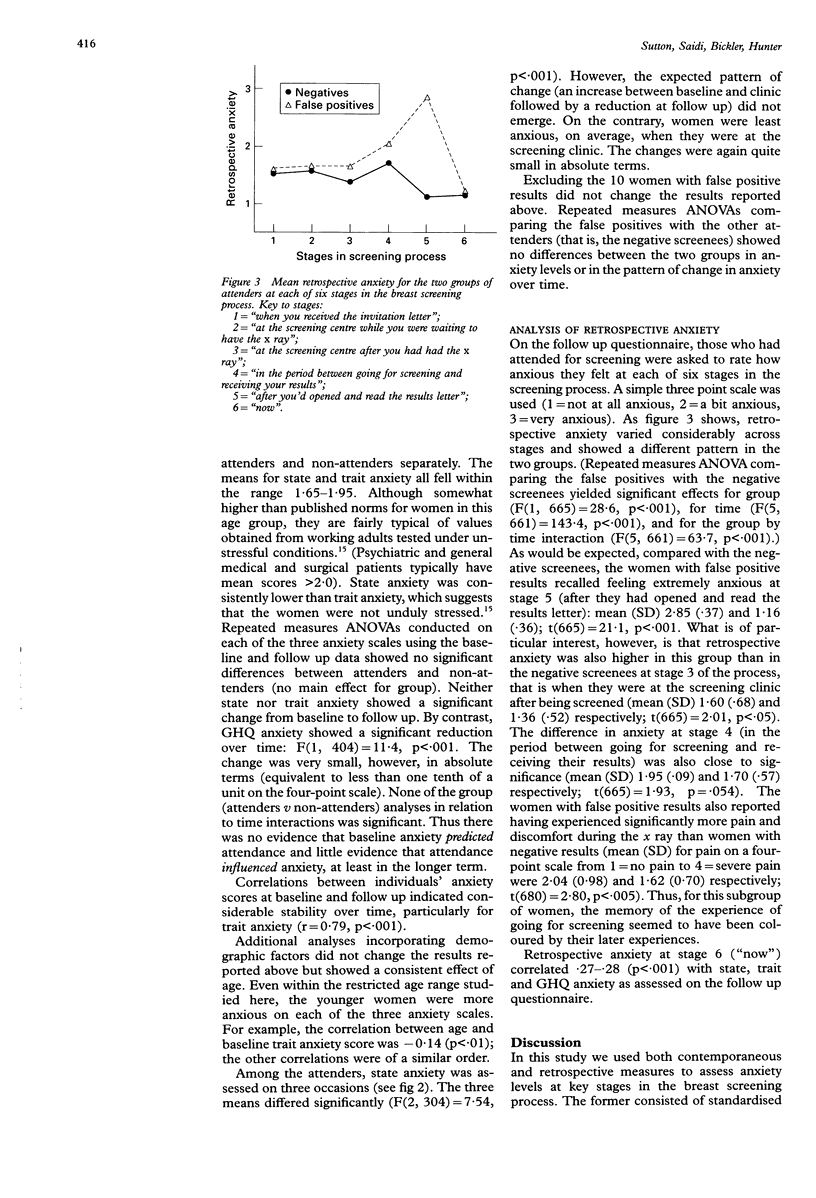
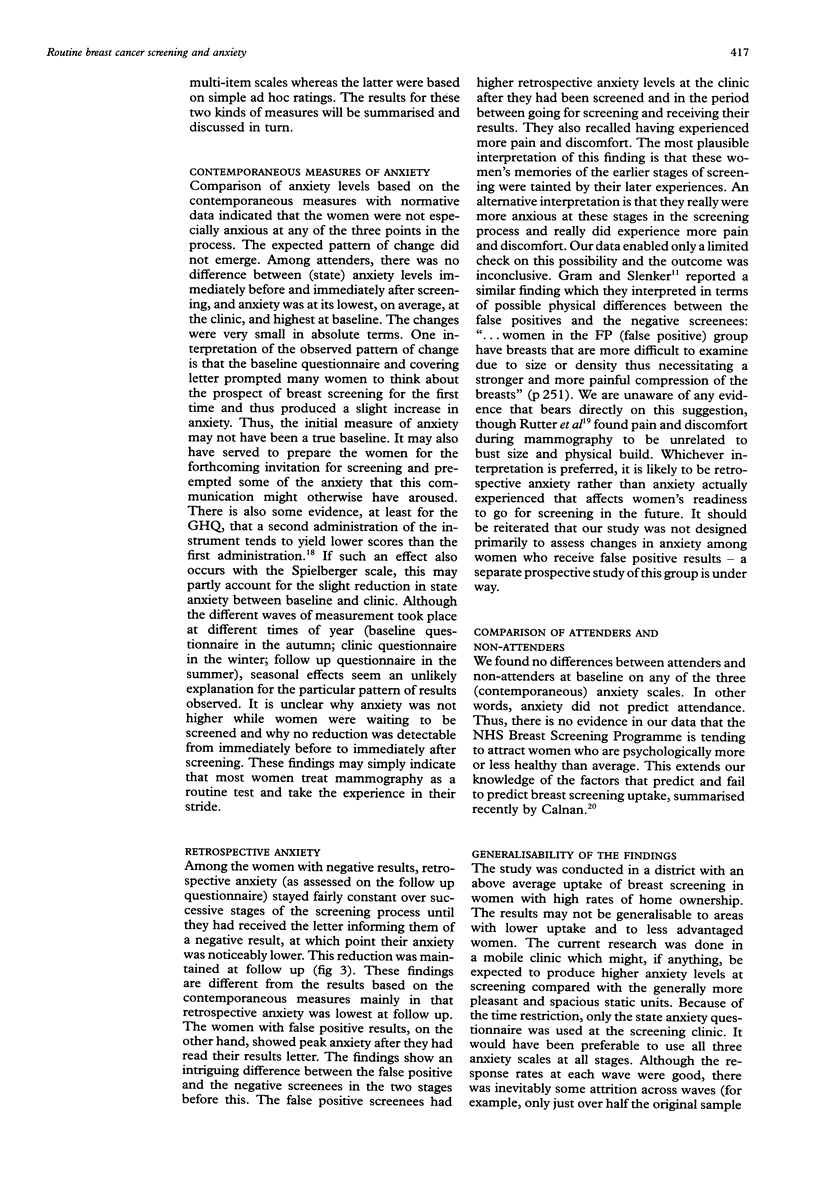
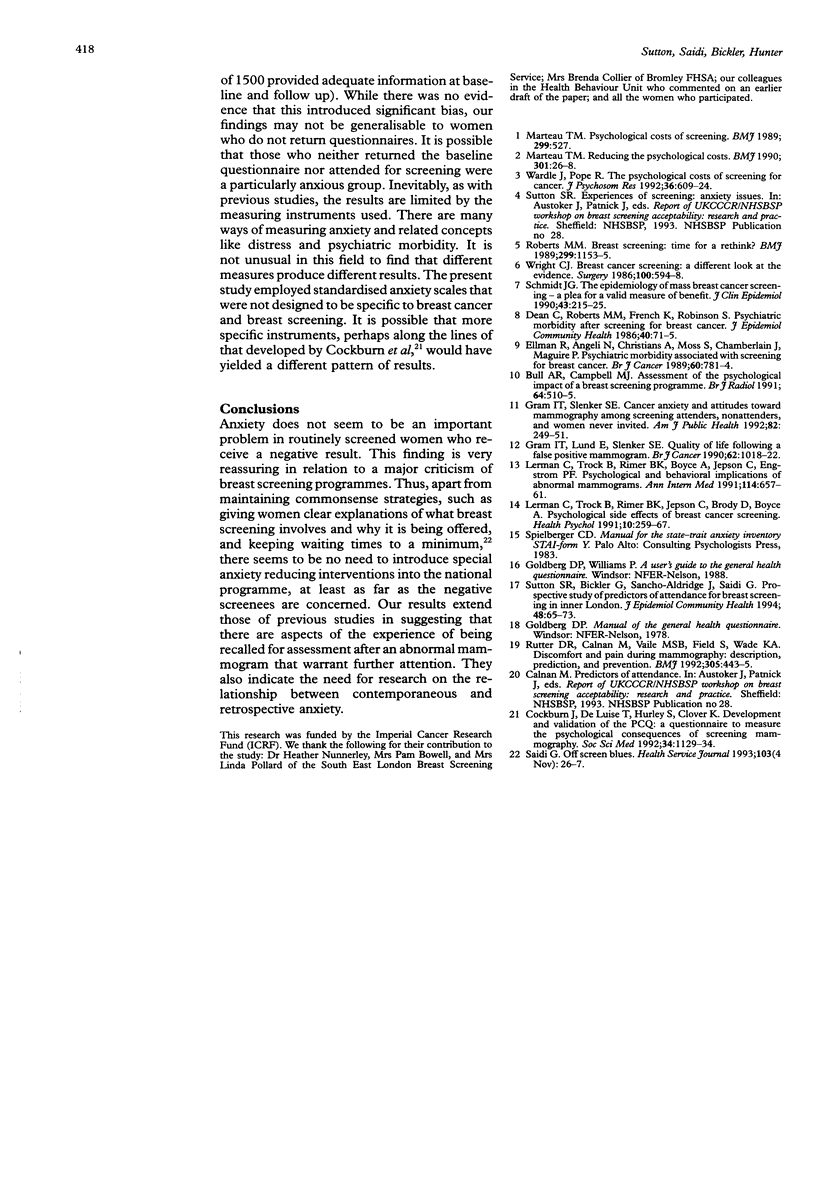
Selected References
These references are in PubMed. This may not be the complete list of references from this article.
- Bull A. R., Campbell M. J. Assessment of the psychological impact of a breast screening programme. Br J Radiol. 1991 Jun;64(762):510–515. doi: 10.1259/0007-1285-64-762-510. [DOI] [PubMed] [Google Scholar]
- Cockburn J., De Luise T., Hurley S., Clover K. Development and validation of the PCQ: a questionnaire to measure the psychological consequences of screening mammography. Soc Sci Med. 1992 May;34(10):1129–1134. doi: 10.1016/0277-9536(92)90286-y. [DOI] [PubMed] [Google Scholar]
- Dean C., Roberts M. M., French K., Robinson S. Psychiatric morbidity after screening for breast cancer. J Epidemiol Community Health. 1986 Mar;40(1):71–75. doi: 10.1136/jech.40.1.71. [DOI] [PMC free article] [PubMed] [Google Scholar]
- Ellman R., Angeli N., Christians A., Moss S., Chamberlain J., Maguire P. Psychiatric morbidity associated with screening for breast cancer. Br J Cancer. 1989 Nov;60(5):781–784. doi: 10.1038/bjc.1989.359. [DOI] [PMC free article] [PubMed] [Google Scholar]
- Gram I. T., Lund E., Slenker S. E. Quality of life following a false positive mammogram. Br J Cancer. 1990 Dec;62(6):1018–1022. doi: 10.1038/bjc.1990.430. [DOI] [PMC free article] [PubMed] [Google Scholar]
- Gram I. T., Slenker S. E. Cancer anxiety and attitudes toward mammography among screening attenders, nonattenders, and women never invited. Am J Public Health. 1992 Feb;82(2):249–251. doi: 10.2105/ajph.82.2.249. [DOI] [PMC free article] [PubMed] [Google Scholar]
- Lerman C., Trock B., Rimer B. K., Boyce A., Jepson C., Engstrom P. F. Psychological and behavioral implications of abnormal mammograms. Ann Intern Med. 1991 Apr 15;114(8):657–661. doi: 10.7326/0003-4819-114-8-657. [DOI] [PubMed] [Google Scholar]
- Lerman C., Trock B., Rimer B. K., Jepson C., Brody D., Boyce A. Psychological side effects of breast cancer screening. Health Psychol. 1991;10(4):259–267. doi: 10.1037//0278-6133.10.4.259. [DOI] [PubMed] [Google Scholar]
- Marteau T. M. Psychological costs of screening. BMJ. 1989 Aug 26;299(6698):527–527. doi: 10.1136/bmj.299.6698.527. [DOI] [PMC free article] [PubMed] [Google Scholar]
- Marteau T. M. Screening in practice: Reducing the psychological costs. BMJ. 1990 Jul 7;301(6742):26–28. doi: 10.1136/bmj.301.6742.26. [DOI] [PMC free article] [PubMed] [Google Scholar]
- Roberts M. M. Breast screening: time for a rethink? BMJ. 1989 Nov 4;299(6708):1153–1155. doi: 10.1136/bmj.299.6708.1153. [DOI] [PMC free article] [PubMed] [Google Scholar]
- Rutter D. R., Calnan M., Vaile M. S., Field S., Wade K. A. Discomfort and pain during mammography: description, prediction, and prevention. BMJ. 1992 Aug 22;305(6851):443–445. doi: 10.1136/bmj.305.6851.443. [DOI] [PMC free article] [PubMed] [Google Scholar]
- Schmidt J. G. The epidemiology of mass breast cancer screening--a plea for a valid measure of benefit. J Clin Epidemiol. 1990;43(3):215–225. doi: 10.1016/0895-4356(90)90002-7. [DOI] [PubMed] [Google Scholar]
- Sutton S., Bickler G., Sancho-Aldridge J., Saidi G. Prospective study of predictors of attendance for breast screening in inner London. J Epidemiol Community Health. 1994 Feb;48(1):65–73. doi: 10.1136/jech.48.1.65. [DOI] [PMC free article] [PubMed] [Google Scholar]
- Wardle J., Pope R. The psychological costs of screening for cancer. J Psychosom Res. 1992 Oct;36(7):609–624. doi: 10.1016/0022-3999(92)90051-3. [DOI] [PubMed] [Google Scholar]
- Wright C. J. Breast cancer screening: a different look at the evidence. Surgery. 1986 Oct;100(4):594–598. [PubMed] [Google Scholar]


